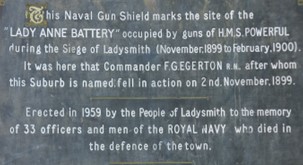The suburb of Egerton, in which Egerton Primary School is situated, received its name after a young 30 year old Lieutenant in the Royal Navy, Frederick Greville Egerton. He was the son of Admiral the Hon. Francis Egerton M.P. & Co. and nephew of the Duke of Devonshire and the Earl of Ellesmere.

He was born on the 15th April 1869, was appointed Lieutenant in 1891 and in 1897 was appointed gunnery officer of H.M.S. Powerful. The naval guns were removed from the battleship and transported to Ladysmith just before the Siege. On 2 November 1899, a flash was seen and all of the British gun crew were ordered under cover. Lt. Egerton and two others remained in the sandbag parapet, the shell burst through the embrasure, mortally wounding Egerton by partially removing both his legs. Making light of his agony as he was lifted onto a stretcher and taken off to hospital in a dhoolie, smoking a cigar, he said, “This will spoil my cricket I’m afraid”. He suffered two amputations and he died the following morning. Lieutenant Egerton was promoted to the ranks of Commander on the day of his death, Queen Victoria being unaware of this fact due to the slow methods of communication available at the turn of the century.


The navel gun shield in place on the end of Jones’ Road marks the spot of the “Lady Anne Battery” where Lietenant Egerton, not less distinguished for skill in his profession than for personal gallantry was mortally wounded.
Egerton Primary School was established nearly twenty-one years later on 2 August 1921 with six teachers and 181 pupils on the roll. Egerton Primary School was initially an English medium school, with “Dutch” lessons being taught for an hour each day. It was only in 1935 that provision was made for Afrikaans speaking pupils.
Some of the difficulties experienced by the early teachers included a snow storm which resulted in poor attendance for three days, a severe drought during which time pupils were expected to bring their own water to school, boiling the school milk because of the danger of enteric, the restriction of bread at meal times because of a flour shortage during the war, frequent cases of truancy and outbreaks of measles, chicken-pox and diphtheria.
